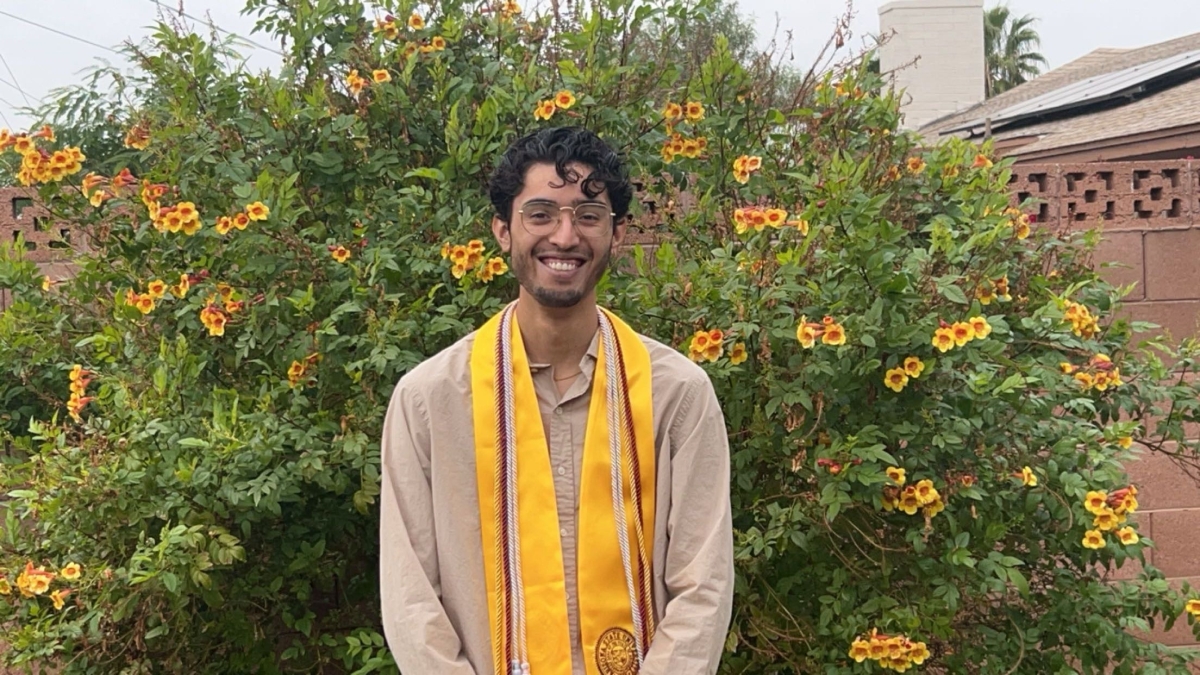Editor’s note: This story is part of a series of profiles of notable fall 2023 graduates.
Sunil Devaraj came to ASU to obtain a degree in biomedical engineering or biology. Once he got to campus, however, he made a dramatic decision.
“After my first year, having dipped my toe in some introductory philosophy courses, I switched to a philosophy major and biology minor,” he said.
Devaraj, a Barrett student and a New American University Scholarship recipient, now has plans to teach for a few years while applying for graduate school philosophy programs.
“I think a consequence of majoring in philosophy is that quite a lot of both what you learn in class and out of class changes your perspective quite drastically. … What has impacted my perspective the most, though, is learning to think carefully and analytically.”
When asked how he would describe his time as a student at ASU, Devaraj said, “I wish it had lasted longer.”
Here are some highlights from the Q&A we had with him:
Question: Which professor taught you one of the most important lessons you've learned at ASU, and what was it?
Answer: Nearly all of my professors taught me lessons worth hanging on to. But definitely ... Professors Joan McGregor (and) Peter de Marneffe taught me some of the most important lessons I learned. Professor McGregor taught me valuable research and writing skills that I will likely keep with me throughout my career, and Professor de Marneffe taught me how to think critically and analytically about difficult problems.
Q. What's the best piece of advice you'd give to other students?
A. The best piece of advice I’d give is to make good friends and to not be afraid to ask questions or to ask for help. Good friends will be there for you when you need it, and professors are always willing to answer questions and help out.
Q. What is your favorite spot on campus, whether for studying, meeting friends, or otherwise? Tell us about a place on campus that is special to you.
A. I enjoy studying and working in the philosophy library on the third floor of Coor Hall. I believe it’s actually called 'the reading room,' and it’s a great space to study and work and even meet with friends or groups.
Q. If someone gave you $40 billion to solve one problem on our planet, what would you do?
A. I believe that one of the most — if not the most — pressing problem, by magnitude alone, is the problem of animal agriculture. Specifically, I think it is a problem that we heavily subsidize animal suffering and unhealthy foods. Not only are the consequences of these subsidies detrimental to ourselves as humans, but also the environment and animal welfare generally. If I was given $40 billion, I would use it to eliminate the subsidies in animal agriculture and instead subsidize healthier and less harmful options.
More Science and technology

From food crops to cancer clinics: Lessons in extermination resistance
Just as crop-devouring insects evolve to resist pesticides, cancer cells can increase their lethality by developing resistance to…

ASU professor wins NIH Director’s New Innovator Award for research linking gene function to brain structure
Life experiences alter us in many ways, including how we act and our mental and physical health. What we go through can even…

ASU postdoctoral researcher leads initiative to support graduate student mental health
Olivia Davis had firsthand experience with anxiety and OCD before she entered grad school. Then, during the pandemic and as a…
